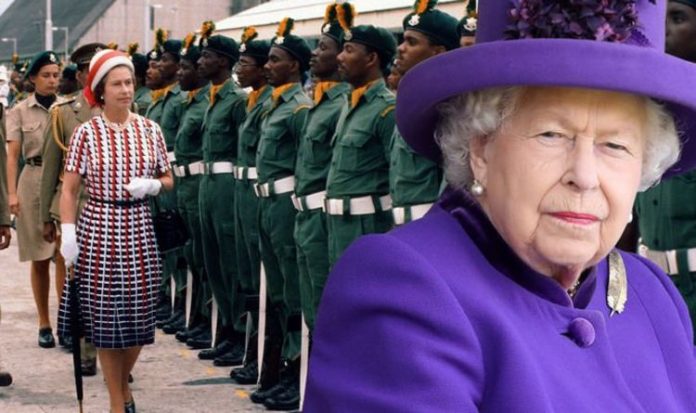The Queen has been staunchly apolitical in the public eye throughout her reign. Her neutrality has been both admired and admonished, but is ultimately credited with ensuring the longevity of the monarchy by making sure she can represent every British citizen and person in the Commonwealth. The Queen is the Head of the Commonwealth — an international organisation made up of 54 countries — and head of state to 16 of those Commonwealth nations.
While her neutrality has, for the most part, united these countries, last year Barbados decided to remove the Queen as its head of state.
This means it would remain a part of the Commonwealth but it would no longer operate as a constitutional monarchy.
It intends to become a republic by November this year.
The Caribbean island nation’s Prime Minister, Mia Mottley, explained back in September: “The time has come to fully leave our colonial past.
“This is the ultimate statement of confidence in who we are and what we are capable of achieving.”
Buckingham Palace said it was not a matter for the Royal Family but one for Downing Street and the people of Barbados.
An insider told the BBC that the concept was “not out of the blue” and has been “mooted and publicly talked about many times”.
Yet, the former Barbados high commissioner to the UK, Guy Hewitt, claimed that the Queen should have intervened — despite the accusations of “playing politics” which would undoubtedly have followed.
Writing in The Guardian, he explained: “Although apolitical, the Queen has acted to guide British sentiment during crises.
“Having done this during the 2014 Scottish referendum by urging voters to ‘think very carefully about the future’, she could have similarly acted in her role as head of the Commonwealth when the Windrush scandal erupted on the eve of the Commonwealth summit in 2018.
“She did not.”
The Queen’s comment to Scots in 2014 was made casually to well-wishers, rather than as a public statement — and yet it still triggered uproar as she was accused of trying to interfere with the Scottish independence referendum.
READ MORE: Meghan and Harry aghast when stripped of Commonwealth roles
He wrote: “Encouragement from her to the British Government to reinforce its commitment in its current role of Commonwealth chair-in-office, to multiculturalism and the right of all its citizens would have been welcomed and justified.”
Others have pinpointed dissent within the Royal Family’s ranks as acting as the final straw in the drawn-out debate about independence in Barbados.
Meghan Markle and Prince Harry sparked outrage among loyal royal fans when they claimed the Commonwealth needs to acknowledge its “difficult” past.
The Commonwealth is made up of nations which used to be part of the British Empire, before becoming independent states and choosing to make up an international organisation.
Meghan, Vice President of the Queen’s Commonwealth Trust, and Harry, the trust’s President, were criticised for seemingly undermining the monarch’s lifelong work uniting the international community.
The Duke and Duchess of Sussex did appear to backpedal as they later praised Harry’s grandmother and her legacy.
However, critics of the Sussexes have since implied that the damage was already done.
By pointing out flaws in the Commonwealth, the couple arguably accelerated Barbados’ quest for independence.







